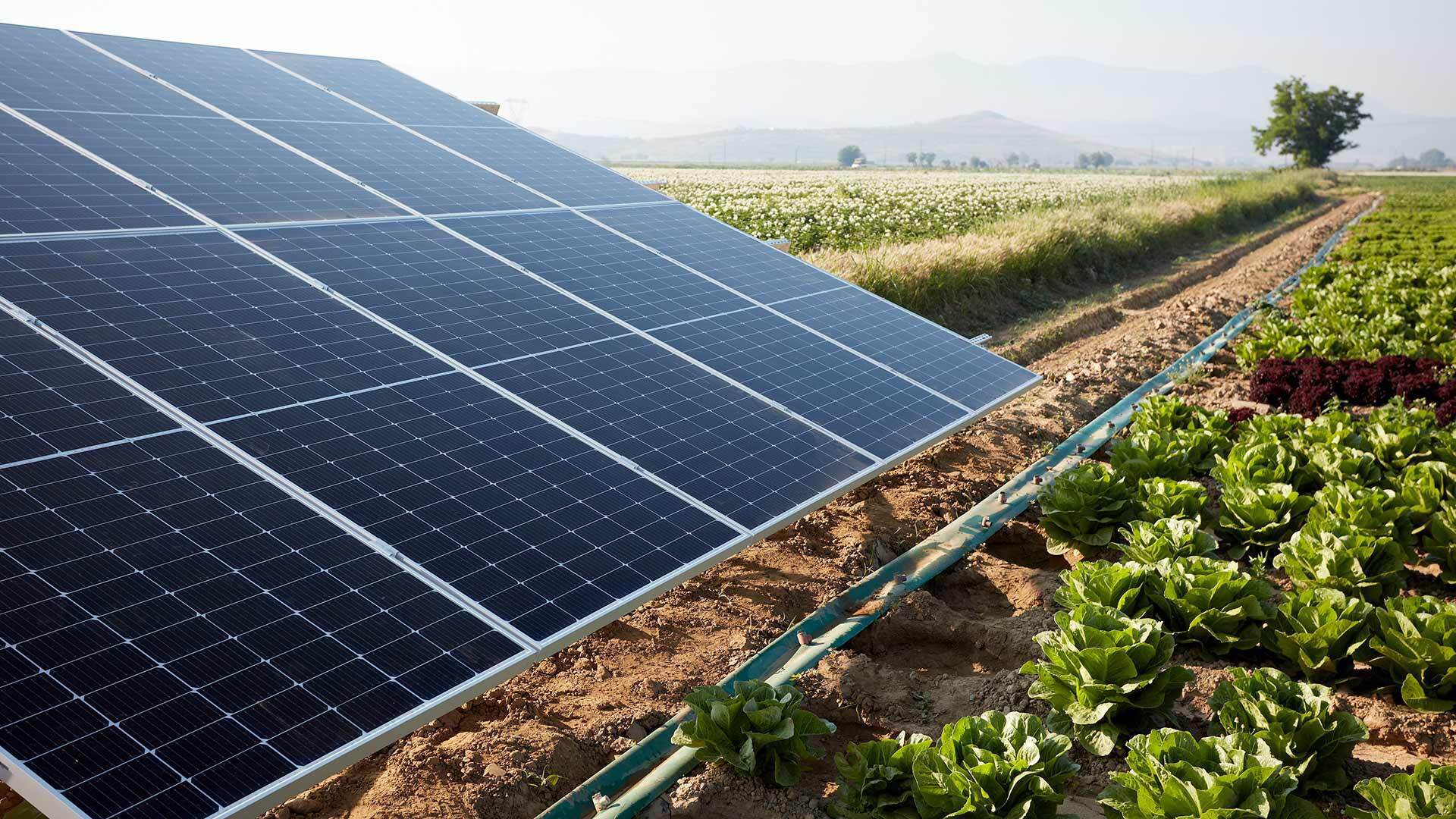- May 07, 2024
- By Karen Shih ’09
Amid swaying stalks of sweet corn across the Eastern Shore or fields of plump orange pumpkins in Western Maryland, something new could soon be harvested on farms across the state: power from the sun.
But just how to place solar panels for optimal energy capture or which high-value crops are most suited for planting around or beneath them is still an open question. A new $100,000 grant from the University of Maryland’s Sustainability Fund could help UMD Extension agents and researchers find some answers.
“There are a lot of benefits to the university, in terms of energy offset and greenhouse gas emissions reduction, as well as to the state,” said Drew Schiavone, energy conservation and technology specialist for the UMD Extension. “There’s a lot of farmers who are interested, but they don’t know how to move forward. Once we demonstrate capacity, we’re expecting more people to be able to implement this model.”
He and other College of Agriculture and Natural Resources researchers will engage student groups to design these “agrivoltaic,” or dual-use crop- and solar energy producing systems, during the next 12 months. Eventually, he hopes to be able to establish half-acre pilot programs at two Extension centers.
The project is one of 13 Sustainability Fund grants totaling $600,000 awarded for 2023-24—more than double the amount distributed last year; the disbursement, a record this year, will increase again to $800,000 next year. Since 2011, the University Sustainability Council and a student-led committee have awarded nearly $4 million for more than 190 projects.
Previous grants have funded Food Recovery Network, rain barrels for Greek life, reforestation across campus and sustainability-related internships in College Park and around the world. This year’s projects measure carbon storage capabilities of mangrove forests, expand bike racks across campus, improve biodiversity and climate resilience at UMD, and more.
Learn about the rest of the 2023-24 awardees:
UMD Golf Course Biodiversity Garden ($68,510): A portion of the course, damaged during a 2022 storm, will be converted into an outdoor classroom featuring native and pollinator-friendly plants.
Student Sustainability Collaborative ($74,762): The Department of Student Affairs initiative introduced this semester supports student internships in divisions such as Residential Facilities, Dining Services, Resident Life and Conferences & Visitor Services.
Bike and Scooter Parking Expansion ($73,750): The Department of Transportation Services will purchase and install 80 new bike racks, adding 640 spaces to campus by the summer of 2026.
ENES 100 School Store ($3,324): The A. James Clark School of Engineering will expand its storage space and cache of materials for “Introduction to Engineering Design,” a required course in which students build a robot. This enables more parts to be recycled and reused by future students.
Mangrove Resiliency ($3,861.20): A senior atmospheric and oceanic sciences student will travel to Florida to obtain soil samples in its tropical forests to better understand their below-ground carbon storage capabilities.
UMD Arboretum Internship ($44,912): The UMD Arboretum and Botanical Gardens will hire seven full-time interns for summer 2024.
Algal Terp Scrubber ($49,540): To reduce pollution in stormwater drainage, the UMD chapter of the American Ecological Engineering Society will install algal turf scrubbers, a system where wastewater flows over a sloped surface seeded with algae to clean it before it flows into the waterways, next to the Terrapin Trail Parking Garage.
University Libraries Sustainability Plan ($36,878): A graduate assistant will conduct a audit and develop strategies to make the libraries more sustainable.
Insect Feed for Methane Mitigation ($36,878): This project will incorporate cricket protein into the diet of UMD dairy cows to measure the relationship between insect-based feed and cows’ production of methane, a powerful greenhouse gas.
Terrapin Works Recycling ($9,876.39): Building a new plastic scrap stock mold will allow Terrapin Works to recycle at least 160 pounds of waste each year from its 3D prints across 17 labs and 213 machines.
Rehabilitation of Stormwater Retention Pond ($24,940): To reduce excess nutrients flowing into the watershed and support biodiversity, the stormwater retention pond on the Institute for Bioscience and Biotechnology Research campus in Rockville, a partnership between UMD, the University of Maryland, Baltimore and the National Institute of Standards and Technology, will be updated and improved.
Stormwater Management and Climate Resilience at UMD ($69,962): Monitors and sensors will be installed across the UMD campus to improve stormwater management, climate resilience and weather reporting.
Topics
Campus & CommunityUnits
Office of Sustainability